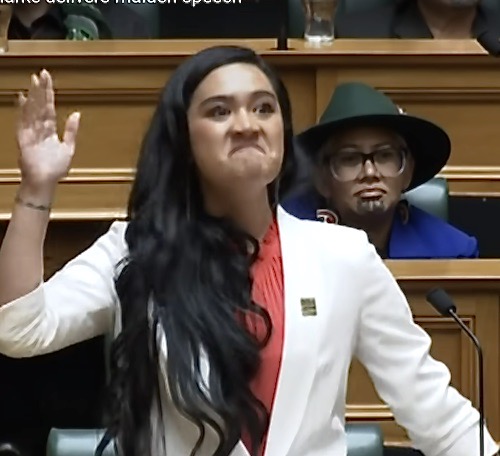|
Maori songs - Kiwi
songs - Home
A ridiculed 'indigestion' verse that was dropped from a 1914 love song has mutated into a 2024 rallying call to young Kiwis to fight far-right capitalism robbing them of their heritage. A 'Folk Process' of Composition
In 1912, 37-year-old Pariare
Tomoana (Ngati Kahungunu) fell
in love with 18-year old Kuini Ripeka Raerena (Nati
Porou) and underwent a very tumultuous range of
feelings before marrying her a year later. He later
expressed his upset feelings in his song Tahi
Nei Taru Kino, "Sweep away this troublesome
weed."
For the second verse he wrote
He aha kei taku
uma What
is this within my chest
Päkikini nei? that pinches so much? He aroha rä nei? Is it love? He aha rä nei? Or what is it? But everybody laughed at this verse and started singing He
aroha rä
nei
Is
it love
He tokopä rä nei? or is it indigestion? The third verse was also rather average, so only the first and last verses were sung from then on, and are still sung to this day. Undeterred, Pariare modified the 2nd verse and the tune and tried again.
World War Two In WW2, He Aha's words were rewritten to encourage young men to join the soldiers of the 28th Maori Battalion, then fighting the fascists in North Africa to stop them from stealing more land, and fighting to regain the land they had already stolen.
I've
changed the usual accents due to a software fault I have that
turns them into ? or Ä.
Hana Rawiti Maipi-Clarke  21-year-old
Hana
Rawiti is the youngest member ever to be legally
elected to stand in parliament. She is the
Waikato-Haaraki member for Te Pati Maori. 21-year-old
Hana
Rawiti is the youngest member ever to be legally
elected to stand in parliament. She is the
Waikato-Haaraki member for Te Pati Maori. In her maiden speech (Read
it here) she spoke of the 34 million acres of
Maori land that the racist English had stolen from her
people, and she criticized the National-led coalition
government for attacking "My whole world from every
corner."
She identified health, the environment, water, land, natural resources and children as her key areas of disagreement with Luxon's far-right government that is backed by international corporations. Hence the significance of
Hana's Waikato supporters singing the anti-Fascist WW2
version of Hei Aha. Her supporters then
followed with the haka Ruaumoko.
Aue Te Aroha
Maori then responded with prophetic movements that kept them in touch with their past and insulated them from the intrusion of the interlopers: Te Ua's Pai Marie, Te Kooti's Ringatu, Te Whiti's Parihaka, as well as Ratana and Maramatanga, with both the latter being inspired by Mere Rikiriki. In the early 1940s, Maramatanga leader Moe Ruka used the tune of He Aha as a waka to carry the verses of Aue Te Aroha, in which he reminds followers of the foundation tenets of their movement. Kiwi
songs - Maori songs - Home
Thanks to David Leine, this was placed on folksong.org.nz in Jan 2024 Free counter |